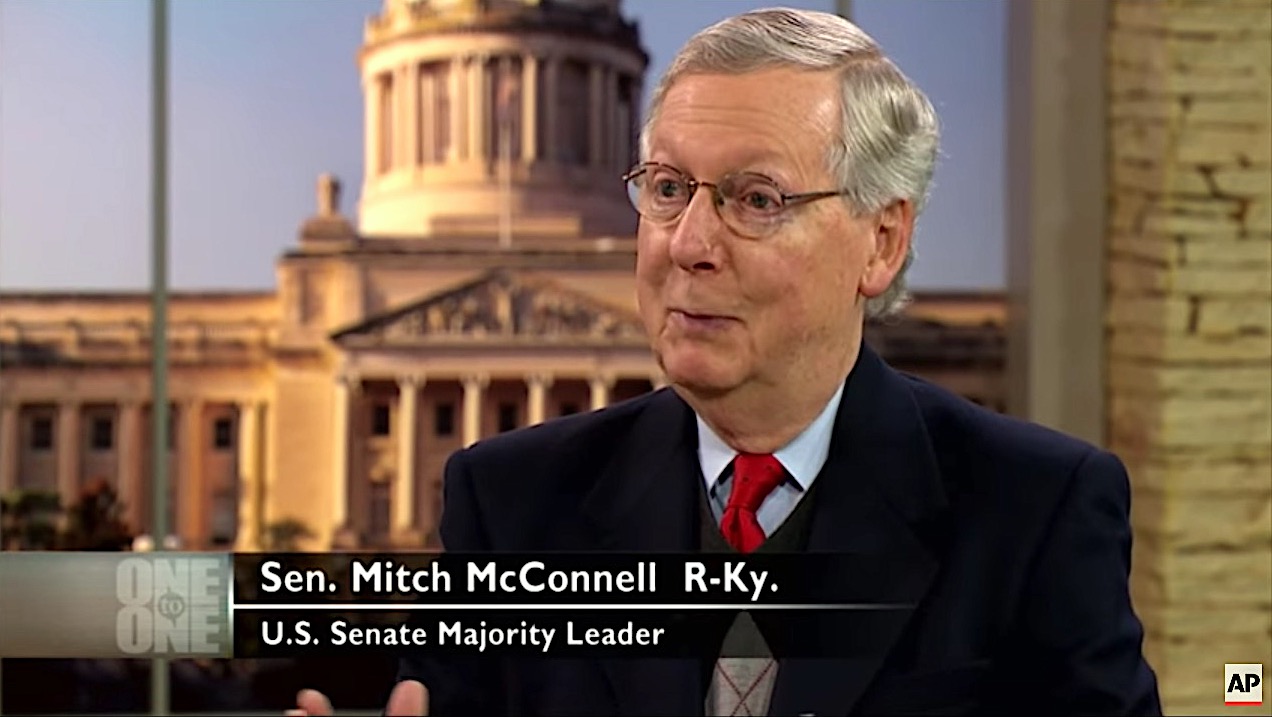Mitch McConnell is shocked Trump, GOP won, rejects special Russian election-hacking committee


A free daily email with the biggest news stories of the day – and the best features from TheWeek.com
You are now subscribed
Your newsletter sign-up was successful
Amid public consensus among the 17 U.S. intelligence agencies that Russia meddled in the 2016 U.S. presidential election, a bipartisan group of senators is pushing for a temporary select committee to be created to investigate Russia's election-season hacking and other cyberattacks on the U.S. On Monday night, in an interview on Kentucky public television, Senate Majority Leader Mitch McConnell (R-Ky.) rejected the idea, saying "We already have a committee established to do this."
There are three Senate committees starting their own investigation — intelligence, foreign relations, and armed services — and Sen. John McCain (R-Ariz.), chairman of the Senate Armed Services committee and a leading proponent of setting up a special committee, says it would be more efficient to give jurisdiction for Russian cyber-meddling to one committee. McConnell disagreed. "We don't need a special committee to set up what we already have the ability to do, but it is a serious matter and it will be investigated," he said. He also dismissed the idea, advocated by the CIA and FBI, that Russian President Vladimir Putin ordered the hacking to help Donald Trump win the election. "If they say they're trying to elect a particular candidate, I think they're going to find out that it didn't do them any good," he said.
McConnell — whose wife, Elaine Chao, is Trump's pick for transportation secretary — said it was "doubly exciting" that Republicans kept control of the Senate and Trump won the White House. "I honestly thought we wouldn't hold the U.S. Senate — I thought we'd come up short," McConnell said. "I didn't think President Trump had a chance of winning." Trump pulled it off, he speculated, because he "was able to convey, oddly enough, a message from a billionaire who lives in Manhattan, a genuine concern for people who felt kind of left out, who were sort of offended by all the political correctness they see around them, and didn't feel like this was the America they were accustomed to." You can watch excerpts of the interview below. Peter Weber
The Week
Escape your echo chamber. Get the facts behind the news, plus analysis from multiple perspectives.

Sign up for The Week's Free Newsletters
From our morning news briefing to a weekly Good News Newsletter, get the best of The Week delivered directly to your inbox.
From our morning news briefing to a weekly Good News Newsletter, get the best of The Week delivered directly to your inbox.

A free daily email with the biggest news stories of the day – and the best features from TheWeek.com
Peter has worked as a news and culture writer and editor at The Week since the site's launch in 2008. He covers politics, world affairs, religion and cultural currents. His journalism career began as a copy editor at a financial newswire and has included editorial positions at The New York Times Magazine, Facts on File, and Oregon State University.
-
 Political cartoons for February 16
Political cartoons for February 16Cartoons Monday’s political cartoons include President's Day, a valentine from the Epstein files, and more
-
 Regent Hong Kong: a tranquil haven with a prime waterfront spot
Regent Hong Kong: a tranquil haven with a prime waterfront spotThe Week Recommends The trendy hotel recently underwent an extensive two-year revamp
-
 The problem with diagnosing profound autism
The problem with diagnosing profound autismThe Explainer Experts are reconsidering the idea of autism as a spectrum, which could impact diagnoses and policy making for the condition
-
 Judge blocks Hegseth from punishing Kelly over video
Judge blocks Hegseth from punishing Kelly over videoSpeed Read Defense Secretary Pete Hegseth pushed for the senator to be demoted over a video in which he reminds military officials they should refuse illegal orders
-
 Trump’s EPA kills legal basis for federal climate policy
Trump’s EPA kills legal basis for federal climate policySpeed Read The government’s authority to regulate several planet-warming pollutants has been repealed
-
 House votes to end Trump’s Canada tariffs
House votes to end Trump’s Canada tariffsSpeed Read Six Republicans joined with Democrats to repeal the president’s tariffs
-
 Bondi, Democrats clash over Epstein in hearing
Bondi, Democrats clash over Epstein in hearingSpeed Read Attorney General Pam Bondi ignored survivors of convicted sex offender Jeffrey Epstein and demanded that Democrats apologize to Trump
-
 El Paso airspace closure tied to FAA-Pentagon standoff
El Paso airspace closure tied to FAA-Pentagon standoffSpeed Read The closure in the Texas border city stemmed from disagreements between the Federal Aviation Administration and Pentagon officials over drone-related tests
-
 Judge blocks Trump suit for Michigan voter rolls
Judge blocks Trump suit for Michigan voter rollsSpeed Read A Trump-appointed federal judge rejected the administration’s demand for voters’ personal data
-
 US to send 200 troops to Nigeria to train army
US to send 200 troops to Nigeria to train armySpeed Read Trump has accused the West African government of failing to protect Christians from terrorist attacks
-
 Grand jury rejects charging 6 Democrats for ‘orders’ video
Grand jury rejects charging 6 Democrats for ‘orders’ videoSpeed Read The jury refused to indict Democratic lawmakers for a video in which they urged military members to resist illegal orders
